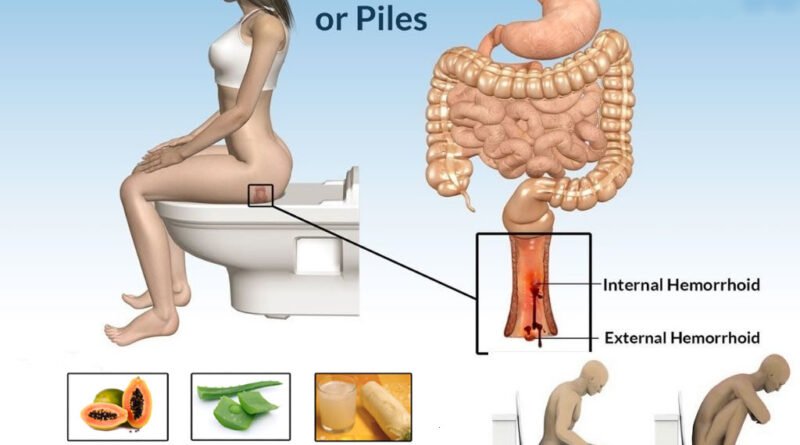Effective Herbal Remedies for Piles Treatment: Natural Solutions for Hemorrhoid Relief
Contents in this article
What is Piles?
Piles, also known as hemorrhoids, are a common condition affecting millions of people worldwide. They are swollen veins in the anal and rectal area that can cause discomfort, itching, pain, and bleeding. Piles can be caused by various factors, such as constipation, pregnancy, obesity, and a sedentary lifestyle.
While there are various treatments available for piles, many people prefer natural remedies to avoid the side effects of medications or surgery. In this article, we’ll explore some effective herbal remedies for piles treatment that can help alleviate symptoms and promote healing.

Piles Hemorrhoids Causes
Piles, also known as hemorrhoids, are swollen and inflamed veins in the rectum or anus. They can be caused by various factors, including:
Straining during bowel movements: One of the most common causes of piles is straining during bowel movements. This can happen due to constipation, which makes the stool hard and difficult to pass. Straining puts pressure on the rectal veins, which can cause them to become swollen and inflamed.
Sitting for prolonged periods:
Sitting for long periods of time, especially on hard surfaces, can put pressure on the rectal veins and lead to piles. This can happen if you have a sedentary lifestyle or if you work at a desk job.
Pregnancy:
Piles are also common during pregnancy due to increased pressure on the pelvic area and hormonal changes that can cause the veins to become more elastic.
Obesity:
Being overweight or obese can increase the pressure on the rectal veins and lead to piles.
Aging:
As we age, the tissues in the rectal and anal area can weaken and become more susceptible to piles.
Family history:
Piles can also be hereditary, meaning if someone in your family has had them, you may be more likely to develop them.
Chronic diarrhea:
Chronic diarrhea can irritate the rectal area and cause inflammation and swelling of the veins.
Chronic coughing or sneezing: Consistent coughing or sneezing can put pressure on the rectal veins and lead to piles.
Common Herbal Remedies for Piles Treatment:
Witch Hazel: Witch hazel is a popular natural remedy for piles that has anti-inflammatory and astringent properties. It can help reduce swelling, itching, and pain caused by hemorrhoids. You can apply witch hazel extract directly to the affected area using a cotton ball or soft cloth.
Aloe Vera: Aloe vera is another well-known herbal remedy for piles that has anti-inflammatory and healing properties. It can help soothe the inflamed and irritated skin around the anus and reduce pain and discomfort. You can apply aloe vera gel directly to the affected area or drink aloe vera juice to help ease constipation.
Butcher’s Broom: Butcher’s broom is an herb that has been used for centuries to treat various health conditions, including hemorrhoids. It contains compounds that can help strengthen the blood vessels and reduce inflammation, which can help relieve piles symptoms. You can take butcher’s broom supplements or use it topically as a cream or ointment.
Horse Chestnut: Horse chestnut is another herb that can help improve blood circulation and reduce inflammation. It can also help relieve pain, itching, and swelling caused by piles. You can take horse chestnut supplements or use it topically as a cream or ointment.
Psyllium: Psyllium is a natural fiber that can help soften stools and reduce constipation, which can help prevent piles from developing or getting worse. You can take psyllium supplements or mix psyllium husk powder with water and drink it daily to help regulate bowel movements.
Chamomile: Chamomile is an herb that has anti-inflammatory and soothing properties. It can help reduce pain and itching caused by piles and promote healing of the affected area. You can make chamomile tea and apply it topically using a cotton ball or soak in a chamomile sitz bath.
Neem: Neem is an herb that has antimicrobial, anti-inflammatory, and analgesic properties. It can help reduce inflammation and pain caused by piles and prevent infections. You can apply neem oil or cream topically to the affected area.
Triphala:
Triphala is an Ayurvedic herbal preparation that contains three fruits: amla, haritaki, and bibhitaki. It can help regulate bowel movements, reduce inflammation, and improve digestion, which can help prevent or treat piles. You can take triphala supplements or mix triphala powder with water and drink it daily.
How Herbal Remedies Can Help Treat Piles:
Herbal remedies for piles treatment can help alleviate symptoms and promote healing in various ways, such as:
Anti-inflammatory properties: Many herbal remedies, such as witch hazel, aloe vera, and chamomile, have anti-inflammatory properties that can help reduce swelling and inflammation caused by piles.
Soothing effects: Some herbs, such as aloe vera and neem, have soothing effects that can help relieve pain, itching, and discomfort caused by piles.
Blood vessel strengthening: Herbs like butcher’s broom and horse chestnut contain compounds that can help strengthen the blood vessels and reduce the risk of bleeding caused by piles.
Laxative effects: Some herbal remedies, such as psyllium and triphala, have laxative effects that can help regulate bowel movements and prevent constipation, which is a common cause of piles.
How to Use Herbal Remedies for Piles Treatment:
Herbal remedies for piles treatment can be used topically or orally, depending on the type of herb and the severity of your condition. Here are some ways to use herbal remedies for piles treatment:
Topical application: You can apply herbal extracts, creams, or ointments directly to the affected area to reduce inflammation, pain, and itching. Be sure to clean the area before applying any herbal remedy and avoid using harsh soaps or wipes that can irritate the skin.
Oral intake: You can take herbal supplements or drink herbal teas to help alleviate symptoms and promote healing from the inside out. Be sure to follow the recommended dosage and consult with a healthcare professional if you have any underlying health conditions or are taking any medications.
Sitz baths: You can also soak in a sitz bath, which is a warm, shallow bath that can help relieve pain and reduce inflammation in the anal and rectal area. You can add herbal extracts or essential oils, such as chamomile, to the sitz bath to enhance its healing properties.
Precautions and Risks:
While herbal remedies for piles treatment are generally safe and effective, they may cause side effects or interact with other medications or health conditions. Here are some precautions and risks to consider when using herbal remedies for piles treatment:
- Potential side effects: Some herbs, such as horse chestnut and butcher’s broom, may cause side effects such as nausea, dizziness, or allergic reactions in some people. Be sure to read the labels and consult with a healthcare professional if you experience any unusual symptoms.
- Interactions with other medications: Some herbs, such as psyllium and neem, may interact with certain medications, such as blood thinners or diabetes drugs. Be sure to inform your healthcare provider if you are taking any medications before using any herbal remedies for piles treatment.
- Precautions for pregnant women and children: Some herbal remedies may not be safe for pregnant women or children, so be sure to consult with a healthcare professional before using any herbal remedies if you fall into these categories.
Other Tips for Piles Treatment:
- In addition to using herbal remedies for piles treatment, there are other lifestyle changes you can make to prevent or alleviate symptoms of piles, such as:
- Diet modifications: Eat a high-fiber diet that includes fruits, vegetables, whole grains, and legumes to prevent constipation and promote healthy bowel movements.
- Hydration: Drink plenty of water and other fluids to stay hydrated and soften stools.
- Exercise: Engage in regular physical activity, such as walking, swimming, or yoga, to improve circulation, regulate bowel movements, and reduce stress.
- Herbal remedies for piles treatment can provide natural and effective solutions for relieving symptoms and promoting healing of this common condition. However, it’s important to consult with a healthcare professional before using any herbal remedies, especially if you have underlying health conditions or are taking any medications. By incorporating herbal remedies and other lifestyle changes into your daily routine, you can prevent or alleviate symptoms of piles and improve your overall health and well-being.


